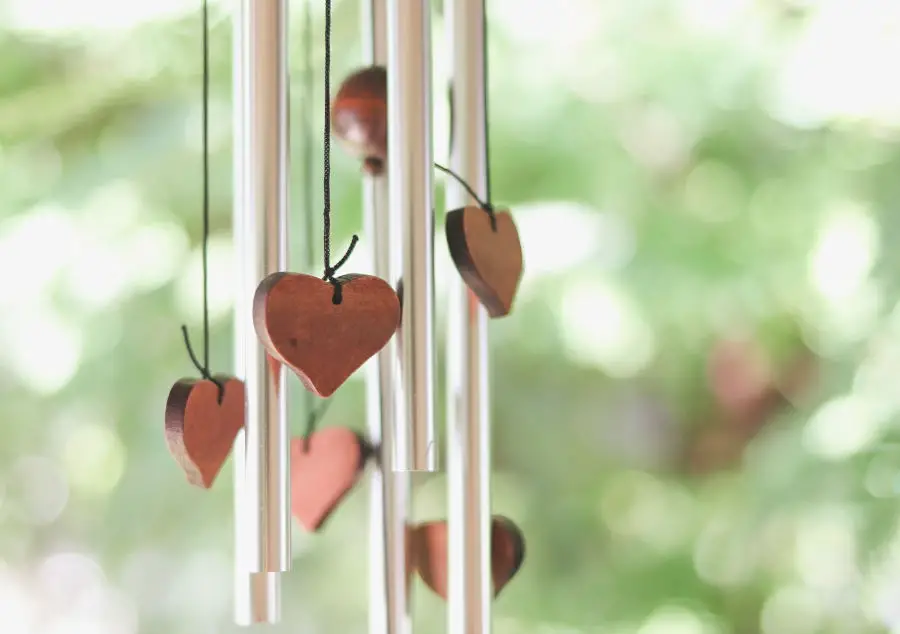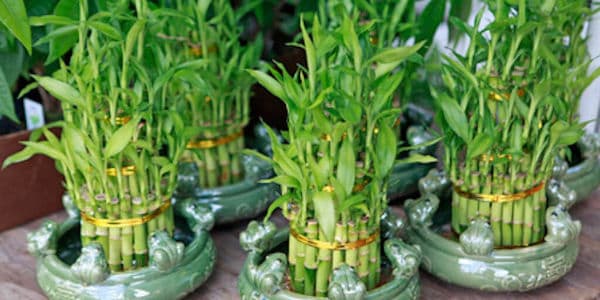Wind chimes hold a cherished place in Chinese culture, embodying a blend of artistry, spirituality, and practicality. Known as “风铃” (fēng líng), they have long been revered for their ability to harmonize a space, attract positive energy, and ward off negativity. Beyond their decorative appeal, wind chimes symbolize peace, prosperity, and protection. They are often found hanging in gardens, doorways, or near windows, gently chiming with the breeze to invite balance and serenity into homes.
For centuries, these soothing sounds have been seen as a way to connect with nature and align human life with the cosmic rhythm. Early civilizations utilized them to ward off evil spirits and attract positive energy. Over time, their significance expanded to encompass a wide range of cultural and spiritual meanings.
This article delves into the fascinating world of wind chimes in Chinese culture. We will explore their historical roots, their profound connection to Feng Shui principles, and their various forms and symbolic meanings. By understanding the cultural and spiritual significance of wind chimes, we can gain a deeper appreciation for their beauty and the profound impact they have had on Chinese society.
Historical Roots of Wind Chimes in China
The use of wind chimes in China dates back over 3,000 years, emerging during the Zhou Dynasty. Initially, they served as practical tools in agricultural societies, where farmers hung simple bamboo or bone chimes near their fields to scare away birds and animals.
As wind chimes evolved, their purpose expanded to include spiritual protection. In ancient temples and homes, wind chimes were thought to dispel evil spirits and invite divine blessings. Taoist monks would hang chimes at sacred sites, believing that the gentle sound could communicate with celestial beings and bring harmony between the heavens and earth.
In later dynasties, wind chimes became more ornate, incorporating intricate designs and auspicious symbols. Their evolution reflects a seamless fusion of practicality, spirituality, and artistic expression, which continues to shape their significance in modern Chinese life.
Materials and Designs of Traditional Chinese Wind Chimes
Traditional Chinese wind chimes are characterized by their diverse materials and intricate designs. While early versions utilized natural elements like bamboo and shells, the introduction of metal allowed for more elaborate creations. Common materials include:
- Bamboo: Known for its flexibility and natural resonance, bamboo wind chimes produce soft, soothing sounds that promote tranquility.
- Metal: Often made from bronze or copper, metal wind chimes can create a range of tones depending on their size and shape. Their durability makes them a popular choice for outdoor settings.
- Ceramics: These chimes often feature painted designs that add an artistic touch while producing a gentle sound.
- Glass: Although less traditional, glass wind chimes have gained popularity for their aesthetic appeal and melodic tones.
The designs of these wind chimes often incorporate auspicious symbols such as dragons, phoenixes, or coins, reflecting cultural beliefs about luck and prosperity. The craftsmanship involved in creating these pieces is not only a testament to artistic skill but also an expression of cultural identity.
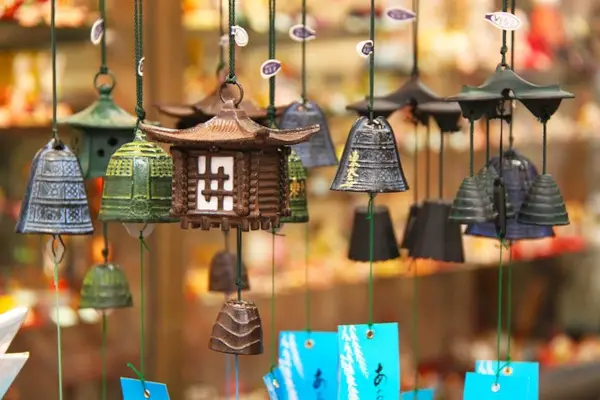
Symbolism and Cultural Importance in Ancient Chinese Households
In ancient Chinese households, wind chimes were far more than mere decorations. They were imbued with deep symbolism and were believed to offer protection and prosperity. Families often hung chimes near entryways to guard against negative energy and to attract positive Qi.
Specific designs, like coins or fish, symbolized wealth and abundance, while others reflected health, longevity, and familial harmony. Wind chimes were also seen as conduits of cosmic energy, bridging the human and spiritual realms.
The soft, melodic tones of the chimes were thought to cleanse the environment, creating a serene and balanced atmosphere essential for daily life and spiritual practice.
The Philosophy Behind Wind Chimes in Feng Shui
In Feng Shui, Qi refers to the vital life force or energy that flows through all living and non-living things. Wind chimes play a crucial role in influencing this energy, as their gentle sounds help to activate and harmonize Qi.
When hung in key areas of a home or garden, wind chimes can disperse stagnant energy and encourage a smooth, positive flow. The movement of air through the chimes symbolizes the seamless circulation of Qi, promoting vitality and balance within a space.
Their ability to transform the energy field makes wind chimes a powerful tool for cultivating harmony and prosperity.
The Role of Sound in Balancing Energy in a Space
Sound is a fundamental aspect of Feng Shui, as it has the ability to influence the vibration and quality of a space’s energy. The soothing tones of wind chimes create a calming atmosphere, which helps to neutralize tension and stress.
Different materials produce unique sounds, each resonating with specific energy frequencies. For example, the clear, sharp tones of metal chimes are believed to cut through negativity, while the softer, hollow sounds of bamboo chimes foster a sense of peace and tranquility.
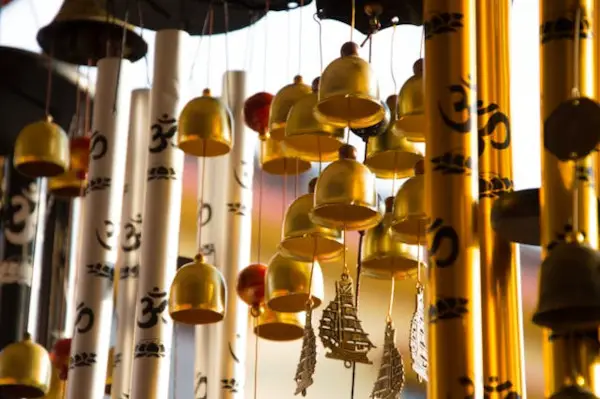
How Wind Chimes Align With the Five Feng Shui Elements
In Feng Shui, the five elements—Wood, Fire, Earth, Metal, and Water—are essential for maintaining balance and harmony in a space. Wind chimes are designed to align with these elements, making them versatile tools for enhancing specific areas of life.
- Metal Wind Chimes: Represent the Metal element, symbolizing strength, clarity, and precision. These are ideal for West and Northwest areas, enhancing creativity and helpful people.
- Bamboo or Wooden Wind Chimes: Embody the Wood element, promoting growth, vitality, and flexibility. They are best placed in the East and Southeast, associated with health and financial abundance.
- Ceramic or Clay Wind Chimes: Correspond to the Earth element, providing stability and grounding energy. These work well in the Northeast and Southwest, areas linked to knowledge and relationships.
- Crystal Wind Chimes: Represent the Fire or Earth element, depending on their design, and are excellent for uplifting energy and spiritual growth.
- Water Features with Chimes: Occasionally, wind chimes are integrated with water elements, symbolizing the flow and adaptability of Water energy.
Types of Wind Chimes and Their Meanings in Feng Shui
Wind chimes come in various materials and designs, each carrying unique meanings and benefits in Feng Shui. Understanding these types can help you choose the right wind chime to enhance the energy flow in your space.
Metal Wind Chimes: Strength and Clarity
Metal wind chimes are a powerful tool in Feng Shui, symbolizing strength, clarity, and focus. Made from materials like aluminum, brass, or bronze, these chimes produce sharp, resonant tones that are highly effective in dispersing negative energy and attracting positive Qi.
They are particularly beneficial in the West (associated with creativity and children) and the Northwest (linked to helpful people and travel).
Metal wind chimes also enhance communication and mental clarity, making them a great choice for home offices or study areas. Their reflective surfaces and crisp sounds uplift the energy of a space, promoting decisiveness and clear thinking.
Bamboo Wind Chimes: Growth and Flexibility
Bamboo wind chimes bring the gentle energy of the Wood element, symbolizing growth, vitality, and flexibility. The soft, natural tones produced by bamboo chimes evoke a sense of calm and connection to nature.
These chimes are ideal for the East (representing family and health) and the Southeast (associated with wealth and abundance).
Bamboo wind chimes are known to encourage steady personal and financial growth while fostering resilience in challenging times. Their presence creates a nurturing and supportive environment, perfect for areas where family members gather or where creative ideas are cultivated.
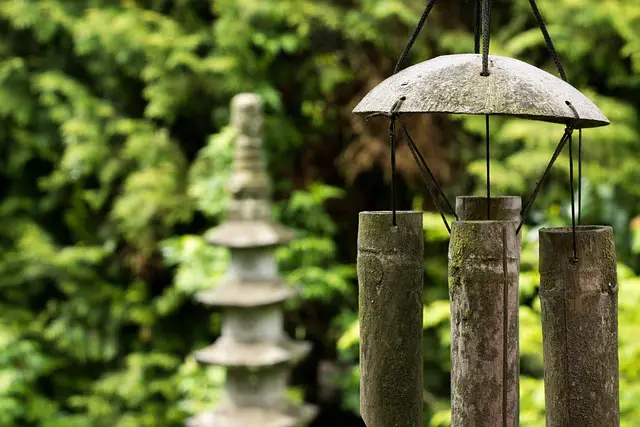
Ceramic Wind Chimes: Calmness and Grounding Energy
Ceramic wind chimes, often made from clay or porcelain, embody the Earth element, promoting calmness, stability, and grounding energy. Their deep, resonant tones have a soothing effect, making them an excellent addition to areas where relaxation and introspection are desired, such as bedrooms or meditation spaces.
Ceramic chimes are particularly effective in the Northeast (enhancing knowledge and self-cultivation) and the Southwest (strengthening love and relationships).
These chimes bring a sense of balance and security, helping to anchor the energy of a space while fostering harmonious interactions.
Crystal Wind Chimes: Spiritual Growth and Harmony
Crystal wind chimes represent purity and spiritual elevation, symbolizing harmony, balance, and enlightenment. Their delicate, shimmering sounds are believed to raise the vibration of a space, making them ideal for enhancing spiritual practices such as meditation or yoga.
Crystal chimes are often associated with the Fire element (when clear or faceted) or the Earth element (when colored or opaque). They are well-suited for the South (boosting fame and recognition) and the Center (balancing overall energy).
Crystal wind chimes enhance inner peace, encourage self-reflection, and promote spiritual growth, creating an environment of serenity and higher consciousness.
| Type of Wind Chime | Symbolism | Best Placement Areas | Feng Shui Benefits |
| Metal | Strength and clarity | Northwest, Southeast | Attracts prosperity, dispels negativity |
| Bamboo | Growth and flexibility | East, Southeast, South | Promotes health, calming sounds |
| Ceramic | Calmness and grounding | Northwest, Southwest | Enhances romance, wisdom |
| Crystal | Spiritual growth and harmony | Any area for spiritual focus | Elevates energy, aids meditation |
🍀 Our “Feng Shui Master” app is your trusted companion, offering a useful guide to implementing Feng Shui principles. Try it now!
Choosing the Right Wind Chimes for Your Space
Selecting the appropriate wind chimes for your home involves careful consideration of several factors, including material, sound, design, and placement. Understanding these elements will help you create a harmonious environment that aligns with Feng Shui principles.
Factors to Consider: Material, Sound, and Design
Material: The material of the wind chime significantly influences its energy and sound. Metal chimes are associated with strength and clarity, while bamboo chimes promote growth and flexibility. Ceramic chimes offer calmness and grounding energy, and crystal chimes enhance spiritual growth and harmony. Choose a material that resonates with your intentions for the space.
Sound: The sound produced by wind chimes is crucial in Feng Shui. It should be pleasing to your ears, as an unpleasant sound can disrupt the positive energy flow. Each material produces distinct sounds; for example, metal creates a sharp, clear tone, while bamboo offers a softer, more soothing sound. Trust your intuition when selecting a wind chime; it should feel like a welcome addition to your home.
Design: The design of wind chimes can also convey specific meanings and intentions. Many chimes feature auspicious symbols or colors that enhance their Feng Shui properties. Look for designs that resonate with your personal aesthetic while also aligning with your goals for energy enhancement.
Matching Wind Chimes to Your Feng Shui Bagua Map
The Feng Shui Bagua map is a powerful tool used to identify areas of life that need attention or enhancement. When choosing wind chimes, consider their placement in relation to the Bagua map:
- Wealth Area (Southeast): Metal wind chimes can attract prosperity.
- Health Area (Center): Bamboo or ceramic chimes promote well-being.
- Love Area (Southwest): Ceramic wind chimes can enhance romantic relationships.
- Career Area (North): Metal wind chimes can support career growth.
By aligning your wind chime choices with the Bagua map, you can effectively target specific areas of life you wish to improve.
The Importance of Size and Number of Rods in Chimes
The size and number of rods in wind chimes play a significant role in their Feng Shui effectiveness. Generally, the following guidelines apply:
- Size: Ensure that the size of the wind chime is proportionate to the space where it will be hung. A small chime may not produce enough sound in a large room, while a large one could overwhelm a small space.
- Number of Rods: The number of rods has symbolic significance:
- 2 or 3 rods: Attract peace and calmness.
- 4 rods: Invite positive energy and are often placed at entrances.
- 5 rods: Represent all five elements (earth, metal, fire, water, wood) and promote harmony.
- 6 rods: Help drive away adverse energies and attract career opportunities.
- 7 rods: Foster creativity and knowledge, ideal for children’s rooms.
- 8 rods: Encourage prosperity and abundance.
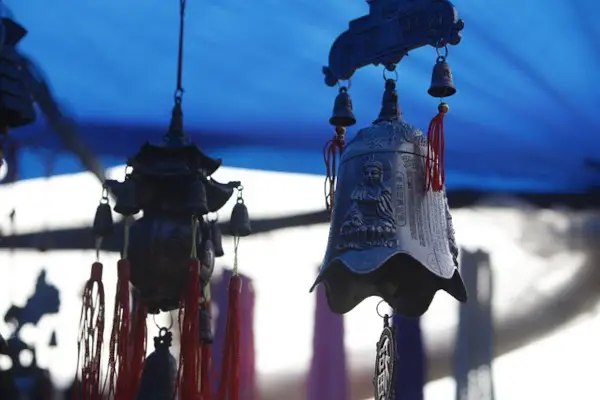
Best Practices for Placing Wind Chimes in Feng Shui
Choosing the right placement for wind chimes is essential to harness their positive energy effectively. The following guidelines will help you optimize their benefits in your home or garden.
Ideal Locations for Wind Chimes in Your Home or Garden
- Near the Front Door: Hanging wind chimes near the entrance is one of the most effective placements. This location invites positive energy (Qi) into your home and creates a welcoming atmosphere for guests. It also acts as a protective barrier against negative influences.
- In the Living Room: Position wind chimes in open spaces or corners of the living room to enhance sound distribution and energy flow. Ensure they are placed away from obstructions, allowing them to catch the breeze and produce soothing sounds.
- By Windows: Placing wind chimes near windows allows natural breezes to activate them, creating a calming sound that promotes tranquility. This placement is especially beneficial in bedrooms or meditation rooms, where relaxation is key.
- Garden Areas: Wind chimes can also be hung in gardens or outdoor spaces where they can catch the wind. This not only enhances the aesthetic appeal of your garden but also promotes a peaceful outdoor environment.
Areas to Avoid for Optimal Energy Flow
While wind chimes can be powerful tools for enhancing energy, improper placement can disrupt the flow of Qi or create imbalances. Here are some areas to avoid:
- Above Beds: Hanging wind chimes above a bed can create a restless and unsettled energy, disrupting sleep and relaxation.
- Directly Over Sitting Areas: Avoid placing wind chimes directly over chairs, sofas, or dining tables, as the constant movement and sound may cause discomfort or tension.
- Bathrooms: Bathrooms are considered spaces where energy can drain, so placing wind chimes here may weaken their positive impact.
- Cluttered Spaces: Wind chimes should not be placed in areas with excessive clutter, as stagnant energy can negate their harmonizing effects.
How to Use Wind Chimes to Enhance Specific Areas of Life: Health, Wealth, and Relationships
Wind chimes can be strategically used to enhance various aspects of life based on their placement:
- Health: To promote health and well-being, place bamboo wind chimes in the eastern area of your home. This aligns with the wood element, which symbolizes vitality and growth.
- Wealth: For attracting prosperity, hang metal wind chimes in the southeast corner of your home. The metal element is associated with clarity and abundance, making it an ideal choice for wealth enhancement.
- Relationships: To strengthen romantic connections, ceramic wind chimes should be placed in the southwest area of your home. This area corresponds to love and partnerships, encouraging harmony and intimacy.
| Feng Shui Bagua Area | Life Aspect | Recommended Wind Chime Material | Ideal Placement |
| East | Health, Family | Bamboo (Wood) | Hang in windows or doorways facing East |
| Southeast | Wealth, Prosperity | Metal or Coin (Metal) | Place in the far-left corner of your home or office |
| South | Fame, Reputation | Metal (Metal) | Hang in the South of your living room or office |
| Southwest | Love, Relationships | Ceramic (Earth) | Place in the far-right corner of the home or bedroom |
| North | Career, Life Path | Bamboo (Wood) | Hang near the entrance or in the northern area of your home |
Want to learn more about Feng Shui? Take a look at these Courses and Books – Aff.link
Wind chimes: Symbolic Designs and Their Impact
Wind chimes are not only beautiful decorative items but also carry deep symbolic meanings in Feng Shui. The designs incorporated into wind chimes can significantly influence the energy within a space, enhancing specific qualities and intentions.
Popular Designs and Their Meanings: Dragons, Phoenixes, and Coins
In Feng Shui, the design of a wind chime significantly influences its energetic impact, with certain symbols carrying specific meanings:
- Dragons: Representing power, protection, and vitality, dragons are among the most auspicious symbols in Chinese culture. A wind chime featuring dragon motifs is believed to attract strong, positive energy and safeguard the home from harmful influences. These are particularly effective in the East, promoting health and family harmony.
- Phoenixes: The phoenix symbolizes rebirth, transformation, and grace. Wind chimes with phoenix designs are ideal for individuals seeking new beginnings or a fresh start in life. When placed in the South, they enhance recognition and bring opportunities for success.
- Coins: Chinese coins, often tied together with red string, symbolize wealth and financial security. Wind chimes incorporating these coins are excellent for activating prosperity energy when placed in the Southeast corner of a home or office.
Incorporating Auspicious Symbols for Luck and Prosperity
To maximize the Feng Shui benefits of wind chimes, many people choose designs that feature additional auspicious symbols. These include:
- Lotus Flowers: Representing purity and spiritual growth, lotus motifs encourage a peaceful and harmonious environment.
- Double Happiness Symbol: Associated with love and marriage, this symbol is perfect for strengthening romantic relationships and is best placed in the Southwest.
- Yin and Yang: This symbol represents balance between opposing forces. Wind chimes featuring yin-yang designs can help harmonize energies within a space, promoting overall well-being.
- The Four Celestial Animals: Representing protection across different directions, these animals (green dragon, red phoenix, white tiger, black tortoise) can be depicted in wind chime designs to create a protective environment while fostering personal growth.
- Gourds (Hulu): A traditional Feng Shui cure for health and longevity, wind chimes with gourd shapes are commonly used to protect against illness.
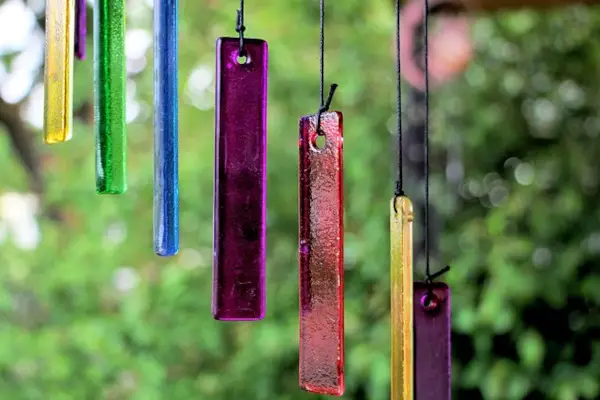
The Impact of Color Choices on Feng Shui Energy
Colors in Feng Shui hold immense significance, as they resonate with different energies and elements. When selecting a wind chime, the color of its components can enhance its intended purpose:
- Red: Symbolizing vitality, passion, and protection, red is often used to activate wealth, fame, or love areas.
- Gold or Silver: These metallic colors represent wealth, clarity, and strength, making them ideal for prosperity and success.
- Green: Associated with the Wood element, green encourages growth, renewal, and healing.
- Blue: Representing the Water element, blue promotes calmness, introspection, and communication.
- Earth Tones: Colors like brown, beige, or yellow foster stability, grounding, and nurturing energy, perfect for enhancing relationships and health.
- White: Symbolizes purity and clarity; helps in enhancing mental focus.
| Design | Symbolism | Feng Shui Application |
| Dragon | Power, Protection, Vitality | Ideal for the East to promote health and family growth |
| Phoenix | Rebirth, Transformation, Grace | Best for the South to enhance fame and opportunities |
| Coins | Wealth, Prosperity | Perfect for the Southeast to activate financial abundance |
| Lotus Flower | Purity, Spiritual Growth | Excellent for meditation spaces to support tranquility and enlightenment |
| Double Happiness | Love, Romance, Marriage | Great for the Southwest to boost relationships and partnerships |
The Spiritual and Emotional Benefits of Wind Chimes
Beyond their Feng Shui applications, wind chimes offer a range of spiritual and emotional benefits.
- Promoting Relaxation and Reducing Stress: The gentle, rhythmic sounds of a wind chime can have a calming and soothing effect on the mind and body. Listening to the chimes can help to reduce stress, anxiety, and tension.
- Enhancing Mindfulness and Meditation Practices: The gentle, repetitive sounds of a wind chime can create a meditative state, allowing you to focus on the present moment and cultivate inner peace.
- Strengthening Emotional Well-being: By fostering a serene and harmonious environment, wind chimes can contribute to a sense of emotional well-being and overall happiness.
Wind Chimes as Gifts in Chinese Culture
When gifting wind chimes in Chinese culture, it’s essential to consider the underlying meanings and cultural etiquette. Wind chimes symbolize harmony, protection, and the invitation of positive energy into the recipient’s home. As such, they are often given with the intention of wishing happiness, prosperity, and good fortune.
It is customary to present wind chimes during auspicious occasions or celebrations. When giving a gift, it is also important to do so with both hands as a sign of respect. Additionally, including a small note or card expressing your good wishes can enhance the sentiment behind the gift.
Wind chimes are suitable gifts for various significant occasions:
- Weddings: Gifting wind chimes at weddings symbolizes the couple’s journey towards harmony and prosperity. They are believed to bless the newlyweds with good fortune and a peaceful home environment.
- Housewarmings: Wind chimes are a popular choice for housewarming gifts as they invite positive energy into a new home. They serve as a gesture of goodwill, wishing the new homeowners happiness and success in their new space.
- Festivals: During cultural festivals such as the Lunar New Year or Mid-Autumn Festival, wind chimes are often exchanged among friends and family. They represent wishes for health, wealth, and happiness in the coming year.
Take a look at some Wind Chimes designs for gifts – Aff.link
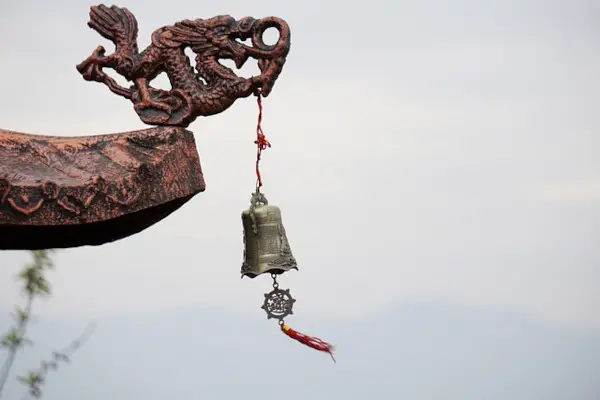
Comparative Analysis: Wind Chimes in Other Cultures
Wind chimes, while deeply rooted in Chinese culture, also have significant representations in other cultures, each with unique meanings and uses. This section explores the role of wind chimes in Japanese culture (Fūrin), Indian spiritual practices, and Western cultures.
Exploring the Use of Wind Chimes in Japanese Culture (Fūrin)
In Japan, wind chimes known as Fūrin (風鈴) are an iconic symbol of summer. The term Fūrin combines the words for “wind” (fu) and “bell” (rin), reflecting their purpose of producing soothing sounds in response to gentle breezes.
Traditionally hung outside homes, shops, and temples, Fūrin are cherished for their melodic tones that evoke a sense of calm during the hot summer months.The origins of Fūrin can be traced back to ancient China, where similar wind chimes were used for fortune-telling.
In Japan, they evolved into protective talismans hung at Buddhist temples and noble residences to ward off evil spirits and misfortune. Over time, especially during the Edo period, glass Fūrin became popular due to Dutch glassmaking techniques introduced to Japan. These glass versions are celebrated for their delicate beauty and gentle sounds, often associated with the refreshing feeling of a summer breeze.
Fūrin are not merely decorative; they are also believed to have a cooling effect on the body and mind. The sound they produce is thought to resonate with nature’s rhythms, providing a refreshing auditory experience that enhances relaxation.
Today, Fūrin continue to be a beloved part of Japanese culture, embodying both aesthetic charm and spiritual significance.
Wind Chimes in Indian Spiritual Practices
In Indian culture, wind chimes play a spiritual role, often tied to the ancient practice of Vaastu Shastra, a traditional system of architecture and design similar to Feng Shui. Wind chimes are used to balance the energies within a space, dispel negative vibrations, and invite positive energy. The sound produced by wind chimes is thought to resonate with the chakras, helping to clear blockages and promote emotional and spiritual healing.
Many Indian wind chimes feature sacred symbols like Om, lotus flowers, or bells, which are often hung in temples or near prayer rooms. The sound of bells, in particular, is considered purifying and is commonly used during rituals to cleanse the space and establish a divine connection. Wind chimes made of metals such as brass or copper are favored for their auspicious properties and their ability to enhance spiritual energy.

The Role of Wind Chimes in Western Cultures
In Western cultures, wind chimes have gained popularity as decorative garden ornaments that add visual interest and soothing sounds to outdoor spaces. They are commonly made from materials like metal, wood, or glass and come in various designs that reflect personal aesthetics.
While Western wind chimes may not carry the same deep spiritual significance as those in Eastern cultures, they are appreciated for their calming effects. Many people use them to create peaceful environments in gardens or patios, enhancing relaxation during outdoor activities. The gentle tinkling sounds produced by wind chimes can evoke feelings of nostalgia or tranquility.
In some Western traditions, wind chimes are also associated with good luck or protection. For example, they may be hung near doorways or windows to keep negative energies at bay.
Additionally, certain designs incorporate symbols such as angels or fairies that align with personal beliefs about guardianship and positivity. Overall, while the cultural significance of wind chimes varies across regions, their universal appeal lies in their ability to create serene environments filled with pleasant sounds.
Creating Your Own Feng Shui Wind Chime: A DIY Guide
Crafting your own wind chime is a rewarding project that allows you to personalize your space while harnessing the positive energy of Feng Shui. This guide will walk you through the essential steps to create a beautiful wind chime that resonates with your intentions.
Before you start, gather the necessary materials to ensure a smooth crafting process. Here’s what you’ll need:
- Chimes: Choose from metal tubes, bamboo, wooden dowels, or even repurpose old silverware for unique sounds.
- String or Fishing Line: Select durable and weather-resistant options, like UV-resistant nylon fishing line, for longevity.
- Top Support: Use a wooden ring, metal hoop, or a sturdy piece of driftwood as the base from which your chimes will hang.
- Drill: This will be essential for making holes in the chimes and top support.
- Measuring Tape: Ensures even spacing and appropriate lengths for your chimes.
- Scissors: For cutting the string or fishing line.
- Decorative Elements: Consider adding beads, shells, or small bells to enhance both sound and visual appeal.
Once you have your materials ready, you can begin assembling your wind chime.
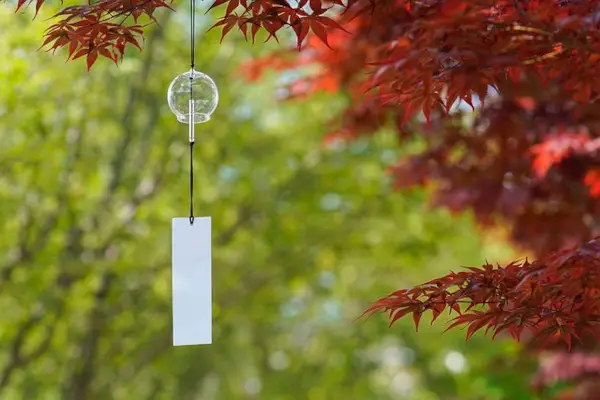
The Art of Hanging: Techniques for Optimal Energy Flow
The placement of your wind chime is crucial in Feng Shui. Here are some tips for hanging it effectively:
- Choose the Right Location: Hang your wind chime where it can catch gentle breezes—ideally near windows or outdoor areas. Avoid locations with strong winds that could cause tangling or damage.
- Height Matters: A height of about 6-8 feet off the ground is ideal for optimal sound. This allows the wind to activate the chimes effectively while being visually appealing.
- Avoid Cluttered Spaces: Ensure that your wind chime has enough space to move freely without obstructions from furniture or decorations. This promotes better energy flow and sound resonance.
- Use Clear String: For visual appeal, use clear fishing line or string that blends with the surroundings while providing strong support.
By following these techniques, you can ensure that your wind chime not only sounds beautiful but also enhances the energy in your space.
Personalizing Your Creation: Adding Special Touches and Meaning
To make your wind chime truly unique, consider adding personal touches that resonate with your intentions:
- Decorative Elements: String beads, shells, or small bells along the strings for added visual interest and sound variation. Ensure these are lightweight to avoid dampening the sound of the chimes.
- Symbolic Features: Incorporate symbols that hold personal significance or align with your Feng Shui goals. For example, using colors associated with specific intentions—red for luck, green for growth—can enhance the chime’s energy.
- Meaningful Materials: If possible, select materials that have personal meaning or history. For instance, using wood from a cherished tree can imbue your creation with emotional significance.
Once all components are assembled and personalized, hang your wind chime in its chosen location and enjoy the harmonious sounds and positive energy it brings to your space.
Related reading: “Chinese Good Luck Charms To Bring Good Fortune” –Opens in new tab
Caring for Your Wind Chimes
Maintaining your wind chimes is essential to ensure they continue to enhance your space with beautiful sounds and visual appeal. Proper care can prolong their lifespan and keep them sounding their best. Here are some tips on cleaning, maintenance, and when to replace them.
Tips for Maintaining and Cleaning Wind Chimes
Regular Cleaning: To keep your wind chimes looking and sounding great, establish a regular cleaning routine. Use a soft-bristled brush or a damp cloth with mild soap to remove dirt and grime. For metal chimes, avoid abrasive materials that can scratch the surface. Instead, use a non-abrasive cleaner suited for the specific metal type (e.g., brass or aluminum) to maintain their finish.
Material-Specific Care:
- Metal Wind Chimes: Clean with a soft cloth and mild soap. For brass parts, consider using a brass cleaner but apply it carefully to avoid altering the natural aging of the metal.
- Bamboo Wind Chimes: Wipe down with a damp cloth and mild soap. Applying natural oils like linseed oil can help prevent drying and cracking, preserving the bamboo’s integrity.
- Wooden Wind Chimes: Use a clean cloth to apply wood oil periodically, which helps protect against moisture and enhances the wood’s natural beauty.
- Ceramic or Glass Wind Chimes: Gently clean with a soft cloth to avoid scratching; harsh chemicals should be avoided as they can cloud the surface.
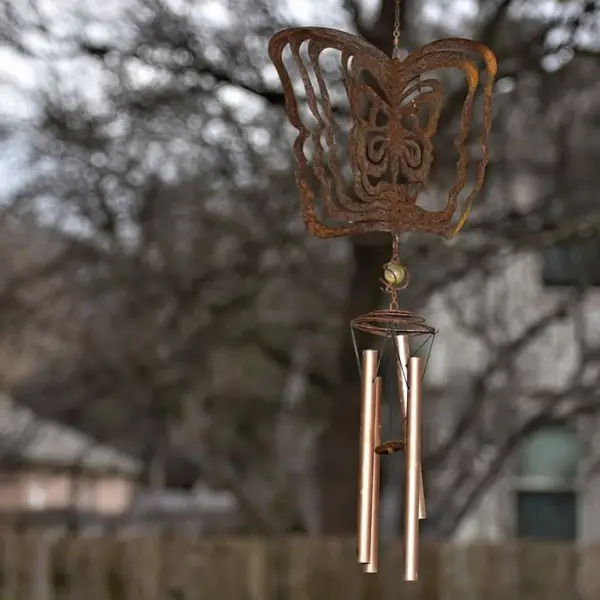
Prolonging the Life and Sound Quality of Your Chimes
To extend the life of your wind chimes and maintain their sound quality, consider these practices:
- Protect from Extreme Weather: Bring your wind chimes indoors during heavy storms or extreme weather conditions. This is especially important for wooden or bamboo chimes, which can warp or crack under harsh conditions.
- Avoid Harsh Chemicals: Steer clear of bleach or strong acidic cleaners that can damage the materials of your wind chimes. Stick to mild detergents for cleaning purposes.
- Inspect Regularly: Periodically check your wind chimes for signs of wear, rust, or damage. Address any issues immediately to prevent further deterioration.
When and How to Replace Old or Damaged Wind Chimes
Wind chimes may eventually need replacement due to wear and tear. Here are some indicators that it’s time for a new set:
- Visible Damage: If you notice significant cracks in bamboo or wood, rust on metal parts, or broken components in glass chimes, it may be time to replace them.
- Diminished Sound Quality: If your wind chimes no longer produce pleasant sounds or have become overly muted, they may require replacement.
- Aesthetic Appeal: If your wind chimes have lost their charm due to fading colors or visible damage, consider investing in new ones that better fit your decor.
- Energetic Shift: Sometimes, wind chimes need to be replaced when they no longer align with your needs or goals. If you’ve made changes in your life (e.g., a new home, a career shift, or a relationship change), you may wish to update your wind chimes to reflect these new energies.
When replacing old wind chimes, take a moment to reflect on their significance and the intentions you wish to set for the new ones. This will help you choose wind chimes that are aligned with your current goals and desired energy flow.
End Words
Wind chimes are more than just decorative elements; they embody rich cultural significance and serve as powerful tools for enhancing the energy of our spaces. From their historical roots in ancient China to their modern applications in homes and gardens, wind chimes continue to resonate with people around the world.
By understanding their symbolism, selecting the right types, and placing them thoughtfully, we can harness their soothing sounds to promote relaxation, mindfulness, and emotional well-being.
Whether you choose to purchase or create your own wind chimes, caring for them ensures they remain a cherished part of your environment. As you incorporate these beautiful instruments into your life, may they bring harmony, prosperity, and joy to your home. Embrace the enchanting melodies of wind chimes and let them enhance your journey toward balance and tranquility.
Want to learn more about Feng Shui? Take a look at these Courses and Books – Aff.link
Stay in Touch
 Join our newsletter by using the forms on this website or click here!
Join our newsletter by using the forms on this website or click here! Follow us on Google News
Follow us on Google News Follow us on Facebook
Follow us on Facebook
Featured Image from Depositphotos

